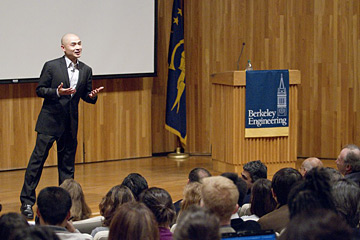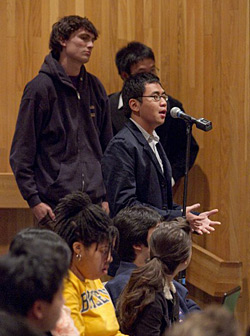Professional master’s opens for enrollment

Coleman Fung (B.S.’87 IEOR) spoke to a full house at Sibley Auditorium on Nov. 19. His talk was one of several events celebrating the launch of Berkeley Engineering’s new professional master’s degree, supported by the Coleman Fung Institute for Engineering Leadership. (Photo by Bay Area Events)
A man of compact build and modest manners, Coleman Fung (B.S.’87 IEOR) is living proof that behind that unassuming demeanor could be lurking an engineering dynamo.
Appearing in Sibley Auditorium on Nov. 19, Fung tossed aside his prepared remarks to engage the audience in a light-hearted exploration of the personality traits of an engineer. His talk, entitled “Preparing Engineers for Leadership,” was one of several events celebrating the launch of Berkeley Engineering’s new professional master’s, a one-year intensive program that combines in-depth technical studies with a core leadership curriculum in business skills like management and finance.
Part of a worldwide trend to offer a broader curriculum that can position engineers at the frontlines of today’s technology-driven industries, the program culminates in a master of engineering (M.Eng.) degree. It began taking applications on Dec. 1 for enrollment in fall 2011.
“Trust me—I’m not a people person!” Fung said, walking across the stage and speaking without PowerPoint slides or podium. “You need to take those communications classes; you need to connect with your peers, your bosses, your customers.” Founder of New York–based software firm OpenLink Financial, Fung gave the college a $15 million gift in 2009 to establish the Coleman Fung Institute for Engineering Leadership, which is helping launch the new master’s degree.
The UC Regents on Nov. 18 had just given final approval to the program, which is designed for recent college graduates and early-career professionals who have demonstrated leadership potential and want to pursue executive-level positions in industry or their own startups or NGOs rather than an academic career.
“We expect graduates of this program to be much sought after in Silicon Valley and other high-tech hubs,” engineering dean Shankar Sastry says. “We’ve realized that we must take a more proactive stance, because creating high-value jobs and new economic development is essential for our future.”
The new program departs from Berkeley’s historical focus on research and producing Ph.D.s, Sastry explains. But about 60 percent of the college’s doctoral graduates already go into industry, a result, he believes, of those students’ own initiative and the high-tech explosion.

Following Fung’s presentation, students lined up to ask questions about the new master’s, a one-year intensive program that combines in-depth technical studies with a core leadership curriculum in business skills like management and finance. (Photo by Bay Area Events)
“Top engineering schools like Berkeley are redefining what it means to be an engineer,” says Ikhlaq Sidhu, Fung Institute chief scientist and professor of industrial engineering and operations research. Graduates of the new program will more quickly land lucrative and influential positions than students without the degree, he adds.
“One of the hardest positions for any company to fill is product manager, because it takes a lot of technical depth, a lot of breadth and a lot of judgment,” Sidhu continues. “This doesn’t mean that you’ll come out of the program and immediately become the next product manager of the iPad. But it will help you get on that path, which is very different from a simpler engineering path where someone assigns you a task and says, here are the specifications, now you write the code.”
Students can choose from among 16 technical tracks, including such industry specialties as computer graphics, decision analytics, sustainable engineering, materials for advanced energy systems and nuclear engineering. They will also take customized classes in business skills specific to technology-dependent enterprises, like opportunity recognition, effective R&D and marketing innovation.
Instead of the traditional master’s thesis, students will work in cross-disciplinary teams to complete a capstone project, an actual industry problem that challenges them to combine their new business savvy with their state-of-the-art engineering know-how in a given sector. Participating in many capstone projects will be representatives from among Berkeley Engineering’s partners in leading industries like Siemens, McKinsey & Company, Genentech and Marvell Semiconductor.
The industry connection is a key component of the program that will provide a “holistic,” real-world context, Sidhu says. Students will complete their leadership coursework and capstone projects in a class cohort, to begin building a career network of classmates, Berkeley Engineering alumni and industrial contacts. Other key features include small class size, customized lectures and a high level of academic support services including professional development and career placement.
Projected cost for the program (excluding a health insurance fee) is $42,000 for California residents and $46,000 for nonresidents, compared to a range of $30,000 to $90,000 per student per degree for similar programs at peer U.S. institutions.
“I wish I had had graduates of this program when I was hiring for Nortel, Bay Networks, Hewlett-Packard and IBM,” commented Dan Pitt, Silicon Valley veteran of both industrial research and academia, following Fung’s talk.
Pitt and other industry leaders will have to wait only a couple more years, until the freshly minted Berkeley M.Eng. graduates of 2012 hit the streets with their powerful toolkit of engineering technology and leadership skills.
For more on the program, go to www.funginstitute.berkeley.edu/masters.
